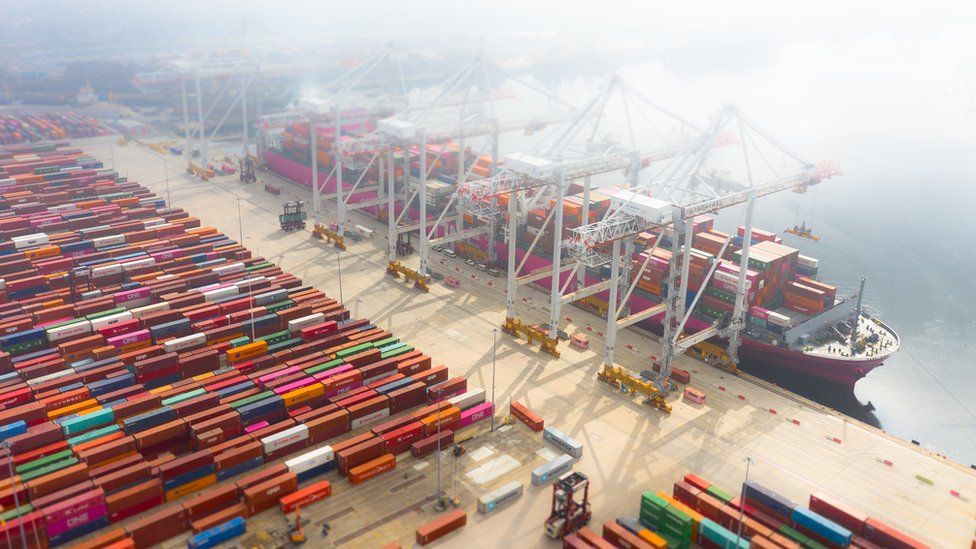BBC News 21 October 2022
- It's not all about the personalities. The problems with leadership of the Conservative Party run deep, and require big decisions about what kind of Britain and what kind of economy it wants to see
- As the party of Brexit, it is finding that leaving the European Union is more difficult and damaging to the economy than "Leave" foresaw, and is only the start of a process with different possible destinations
There could be many reasons, according to your taste. But here are three. There's a problem in the selection process that has led to people rising to the top before it's clear they are capable of leading people, of leading thought, of governing, and of holding the party together.
In a parliamentary system, it used to be that you only got to lead a major party after years of learning and honing the many skills required, while proving your ability and fitness for the job to those around you. Not any more.
One theory of leadership and power is that the people who most crave it are often the people who should not be allowed to achieve it. It's a theory with which the Conservative electorate may be unfamiliar.
Second, holding the parliamentary party together has become more difficult.
Factions have developed, over Europe of course, but also to fight culture wars, to rein back on climate change measures, to represent the working class interests of new, north of England MPs, while ex-ministers exiled from office by incoming prime ministers have questioned why they should stay loyal.
It is less united in the background and outlook of its MPs. A culture of deference and discipline has been weakened by decades of rebellion over Europe. That's no bad thing, you might think. The point is that it makes leadership more difficult.
Third, this is not just about competing egos. It's about competing visions of where Tories want to take the country and the economy.
'Get Brexit Done'
This was a party that has not grown up around any philosophical base. You could argue that it was based on, if anything, an English or perhaps a British tendency to be wary of ideologies.
Conservatives have been successful as an election-winning machine for nearly two centuries by being pragmatic - by reading the electorate and by doing what it takes to win and hold power.
But it has had a sort of ideology bolted on to it. A strand of British nationalism and exceptionalism has become more prominent, and it has bound the party inextricably with Brexit.
The battles over Britain's relations with Europe were important to the removal of Margaret Thatcher. John Major's administration was run ragged by what he termed Euro-sceptic "bastards".
From 13 years of opposition, David Cameron emerged with a message that the party had to be about more than Europe.
That didn't last long. In office, he was forced to promise a referendum if he got a majority. He under-estimated the ability of his own party colleagues to mobilise the "Leave" vote, losing him that vote and costing him his job.
The next three leaders sought to "Get Brexit Done", as Boris Johnson summarised it in the 2019 election slogan. In doing so, he expelled party members who continued to fight for a less hardline Brexit deal than the one Theresa May and Johnson favoured.
By removing that centre right Remainer tendency, it should have made it easier for Liz Truss to unite the party around a clear vision of where Brexit is taking the UK.
Yet it was on those issues that she faltered. The spectacularly botched mini-budget reflected a belief that "Taking Back Control" meant the occupants of Downing Street, having secured control of Parliament, were free to do as they wished.
The fall-out from that tax-cutting splurge showed that the bond markets and other institutions, including the Bank of England and Office for Budget Responsibility, put constraints on the freedom of manoeuvre even of a post-Brexit prime minister. The "control" they took back from Brussels was not as unconstrained as they had thought.
And that was before Liz Truss and Kwasi Kwarteng had the opportunity to engage with the inevitable resistance to the "supply-side" changes they wanted to make, in de-regulating planning, fracking, employment and environmental rules.
As the party of Brexit, the results of leaving the single market and customs union are now challenging Conservatives to define where that decision is to take them and the nation.
The impact on the economy from the point of disengagement at the start of 2021 has not been clear because of so many other factors around the pandemic.
But we are now seeing a clearer picture emerge of how much less trade Britain does with the European Union, and it has been illuminated in a new report from the Economic and Social Research Institute.
Economists there compared Britain's trade performance with other countries as global trade recovered from the worst of the pandemic. Even though there are fewer constraints on goods traffic from the EU to the UK, because Britain has declined to impose the checks it agreed it would, economists found that has fallen by 20%.
Goods traffic from the UK to EU has held up better. There are checks, paperwork and delays for trucks crossing the North Sea and Channel, but that is still 16% below where these economists think British trade would be if Brexit had not changed its relations with the EU.
Ireland has a different story of increased trade; much less going from Britain across the Irish Sea, but more going the other way, or into Northern Ireland, on a border where there are no barriers to trade.
Where, then, does the UK government go to show that Brexit can and will work? To trade deals with other countries, beyond Europe, which we are told have faster-growing economies and will want to improve trade with the UK. These are taking a longer time to secure than Brexiteers had expected.
The ones signed off with New Zealand and Australia have met resistance in the UK, for the impact they will probably have on farming, with only modest gains in removing export barriers.
A limited deal with India was aimed at sign-off around Diwali - this coming Monday - but that deadline will be missed, and expectations are being lowered. Even if the strategy is successful, these will take years to offset the fall in EU trade.
So the new mantra, under Liz Truss, became "Growth, Growth, Growth". Since the financial crash in 2008, it's been sluggish.
As tax was put up by Rishi Sunak to repair the damage to public finances from that bank crash and from the pandemic, and to prepare for the rising demographic demands for more social care, the party pushed back.
The members recoiled at the taunt that taxes, under Rishi Sunak's stewardship, haven't been as high in 70 years. They preferred the glib tax-cutting agenda of his rival. As premier, armed with their mandate, Liz Truss executed a reckless handbrake turn on taxes, in the hope of picking up speed for growth by going in the opposite direction... and crashed.
That leaves many questions about how to piece things together again and what follows. Whoever wins the race for Number 10 has to contend with the guy next door. Jeremy Hunt could be the neighbour from hell, because he effectively represents market discipline.
While (so far) out of the leadership race, the chancellor gets to make many of the crucial choices in his medium-term fiscal plan on Hallowe'en - due only three days after the new leader is elected.
On Friday, he puts his plan to the Office for Budget Responsibility, which judges the effect they can be expected to have on revenues, growth and inflation. It may already be too late for the next prime minister to intervene.
Hunt looks like the person placed on the board of a company in financial distress by its main creditor, wielding a veto over anything else the board might decide.
If the next leader accepts that Hunt remains Chancellor, he will sit at the Cabinet table as the representative of the bond markets. If the next leader doesn't like him there, the bond markets may respond negatively, unless someone replaces him who is at least as hawkish.
Re-shaped economy
The decisions to be made around future budgets are not just for short-term expediency, to get them through the next election. They require Conservatives to decide what path they're on, and what the destination of Brexit is.
How big do they want the British state to be? Are they for leaning in to intervene in investment, as Johnson said he would, to help level up the left-behind parts of Britain? Or are they, like Margaret Thatcher, for rolling back the frontiers of the state, and letting the market allocate resources where they can be deployed most efficiently?
Will they honour the pledge, renewed on Wednesday by Liz Truss, to increase the pension by the price inflation rate, now at 10.1%, and at what cost to other spending departments? Will those dependent on welfare benefits lose out in real terms, again?
Will they stick with Boris Johnson's expensive pledge on social care, pumping enough money into the system to lower the risk, in England, of having to sell your home if you need to go into a care home? (That spending would feed through to devolved block grants).
Will the next leader show much interest in climate change, as Cameron and Johnson did, but May and Truss did not? If they do, what priority will it have? Will they continue with Liz Truss's pledge to boost defence spending by nearly 50%?
A vital question is how they wish to use the potential of Brexit to re-shape the economy. Liz Truss was for a free enterprise, de-regulated, low tax economy characterised by helping people at the top to earn lots, and keep more of those earnings, while the benefits "trickle down".
So long as the economy grows, she was unconcerned with the way in which policy distributed its benefits. She could not acknowledge that a tax giveaway to the highest earners might look unfair, and none of her cabinet seemed to spot that problem until it was too late. Will that approach change?
More migrants?
A vital issue where she clashed with her own choice of home secretary was on immigration. Being tough on it, particularly in stopping free movement of Europeans into British jobs, was one of the main planks of the Tory appeal to voters - and successfully so, as Suella Braverman was pointing out.
That is one reason why Ms Braverman voiced concerns about the emerging deal with India, which may eventually open up goods trade for British exporters in exchange for work permits in Britain.
But in prioritising "growth, growth, growth", Liz Truss saw that the obstacles put in the way of recruiting from overseas are holding back the capacity of the British economy to grow.
On that much, she was in tune with business lobbies. Apart from inflation, acute recruitment difficulties are widespread. With polls showing lowered post-Brexit public concern about immigration, the 44-day prime minister was for opening the immigration taps a bit more.
Real, difficult choices were apparent in this summer's leadership contest. The decision taken by Tory members was to go with the feel-good, low-tax, 21st Century Thatcher.
It didn't work. So what are they going to try next?





